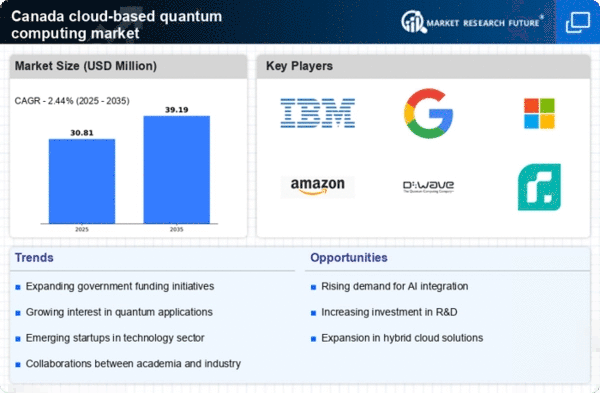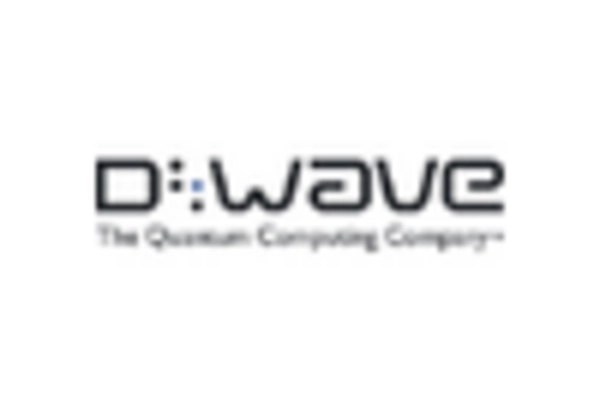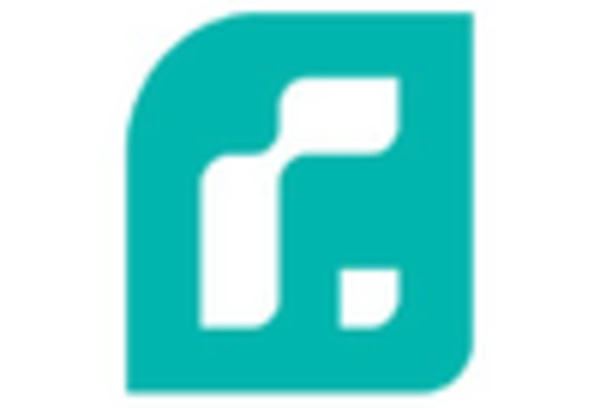Growing Demand for Data Security
The growing demand for enhanced data security is influencing the cloud-based quantum computing market in Canada. As cyber threats become more sophisticated, organizations are seeking advanced solutions to protect sensitive information. Quantum computing offers the potential for unprecedented levels of security through quantum encryption methods. This demand for secure data transmission and storage is likely to drive the adoption of cloud based-quantum-computing services. Companies that can provide robust security features may gain a competitive edge, further propelling the growth of the market in Canada.
Advancements in Quantum Algorithms
The cloud-based quantum computing market in Canada is experiencing a surge in advancements related to quantum algorithms. These algorithms are crucial for solving complex problems that traditional computing struggles with. As research institutions and tech companies collaborate, the development of more efficient quantum algorithms is likely to enhance the capabilities of cloud based-quantum-computing services. This could lead to increased adoption across various sectors, including finance and pharmaceuticals, where optimization and simulation are vital. The potential for these algorithms to reduce computational time significantly may attract more investments, thereby driving growth in the cloud based-quantum-computing market.
Investment in Quantum Infrastructure
Investment in quantum infrastructure is a key driver for the cloud-based quantum computing market in Canada. The establishment of quantum data centers and the enhancement of existing cloud infrastructures are essential for supporting quantum computing capabilities. Recent reports indicate that Canadian investments in quantum technology have reached approximately $1 billion, reflecting a strong commitment to developing a robust ecosystem. This financial backing is likely to facilitate the deployment of cloud based-quantum-computing services, making them more accessible to businesses. As infrastructure improves, the market is expected to expand, attracting a wider range of users seeking advanced computational solutions.
Emergence of Quantum-as-a-Service Models
The emergence of Quantum-as-a-Service (QaaS) models is transforming the cloud-based quantum computing market in Canada. These models allow businesses to access quantum computing resources on a subscription basis, reducing the need for significant upfront investments. This accessibility is likely to democratize quantum computing, enabling small and medium-sized enterprises to leverage advanced computational power. As more companies adopt QaaS, the market is expected to expand, fostering innovation and collaboration across various sectors. The flexibility and scalability offered by QaaS could be a game-changer for organizations looking to integrate quantum computing into their operations.
Collaboration Between Academia and Industry
The collaboration between academia and industry plays a pivotal role in shaping the cloud-based quantum computing market in Canada. Universities and research institutions are increasingly partnering with tech companies to drive innovation in quantum technologies. These collaborations often result in the development of new applications and services that leverage quantum computing capabilities. As a result, the market may witness a rise in the number of startups and established companies offering cloud based-quantum-computing solutions. This synergy not only fosters innovation but also enhances the overall competitiveness of the Canadian technology landscape.

















